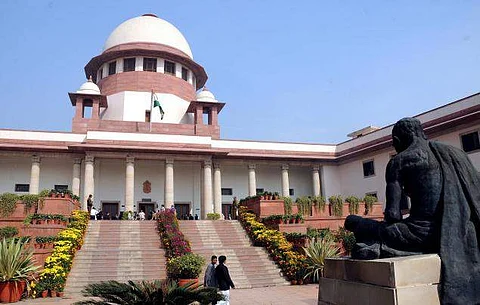

NEW DELHI: The Delhi government today told the Supreme Court, which is hearing pleas on whether the Lieutenant Governor or the Delhi government enjoyed supremacy in administration, that its legislative powers must be accompanied by executive authority to enforce the laws.
The Arvind Kejriwal government commenced its rejoinder submissions before a five-judge constitution bench headed by Chief Justice Dipak Misra after the Centre concluded its arguments on November 30.
Senior advocate Gopal Subramanium, appearing for the city government, said, "one who makes the law must have the power to execute the law".
Referring to the principle of "collective responsibility" of council of ministers, he told the bench, which also comprised Justices A K Sikri, A M Khanwilkar, D Y Chandrachud and Ashok Bhushan, that there cannot be a situation where legislative powers of a government was not supported by the executive authority to execute enacted laws.
The Westminster system of governance envisaged that the council of ministers would be guided by the principle of collective responsibility and it cannot be said that the MLAs are elected advisors of the Lieutenant Governor.
Referring to Article 239AA of the Constitution which deals with the power and status of Delhi, the bench said it did not say that the Lieutenant Governor would act as per the aid and advice of the council of ministers.
It rather said the LG can take decisions pending final adjudication of the dispute by the President.
The advancing of rejoinder submissions remained inconclusive and would resume tomorrow.
Earlier, the apex court had said it would only lay down the principles on the status of the national capital under the Constitution and not deal with the issues arising out of individual notifications issued by the Delhi government on matters like 'mohalla clinics' and regularisation of guest teachers.
Prior to this, the Centre had refuted Delhi government's charge that the LG sits over its proposals and files and had asserted that 96 per cent of its decisions were approved by the LG within 2-3 days.
The top court is hearing a clutch of appeals filed by the AAP government challenging Delhi High Court's verdict holding LG as the administrative head of the national capital.
The Centre had also said the Delhi government cannot have "exclusive" executive powers as it would be against national interests. It had referred to the 1989 Balakrishnan committee report that had dealt with reasons for not granting the status of state to Delhi.
It had referred to the Constitution, the 1991 Government of National Capital Territory of Delhi Act and the Transaction of Business of the Government of National Capital Territory of Delhi Rules to drive home the point that the President, the union government and the LG had supremacy over the city dispensation in administering the national capital.
On the other hand, the Delhi government had accused the LG of making a "mockery of democracy", saying he was either taking decisions of an elected government or substituting them without having any power.